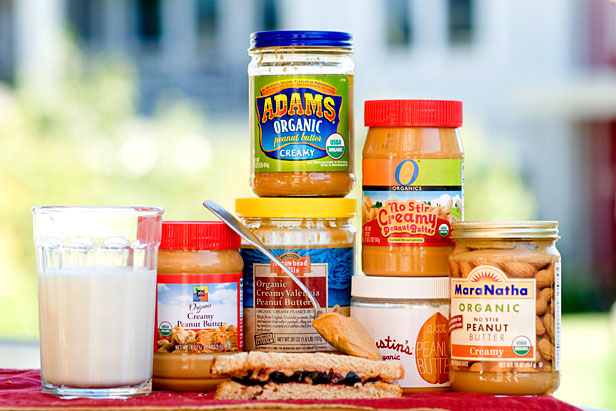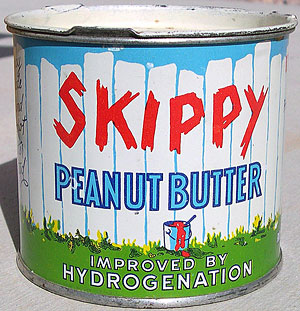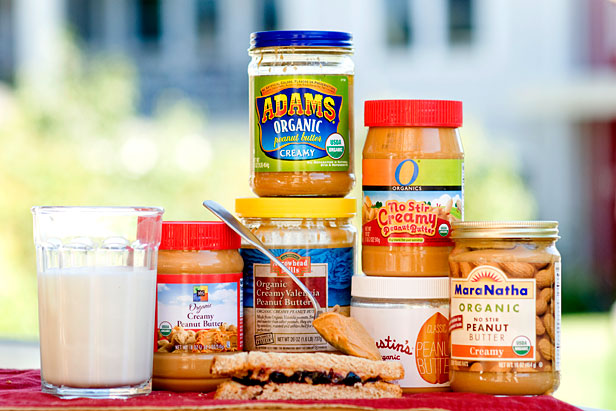 Butter up! Six organic, creamy nut butters were put to the test for mouthfeel, flavor, and overall satisfaction.Photo: Stacey Potter
Butter up! Six organic, creamy nut butters were put to the test for mouthfeel, flavor, and overall satisfaction.Photo: Stacey Potter
Does anyone else long for the days when rat droppings were the scariest thing about peanut butter? Anyone? Show of hands?
Let’s see. The problems with peanut butter now include:
- Really scary chemicals, including neurotoxins (as if we need something else getting on our nerves).
- Deadly salmonella outbreaks.
- The mysterious rise of very serious peanut allergies.
- A peanut butter aisle so big that it makes you want to curl into a ball and rock back and forth — right there in the store — from stimulation overload. (Omega-3 peanut butter … really?)
- Rat feces, still.
- The Frankenut-butter threat. Although there are no genetically modified peanuts on the market right now, according to the National Peanut Board website, money is being poured into genomic research. (Note to peanut growers: Consider inserting the genes of a Labradoodle. As far as I can tell, no one is allergic to them.) But seriously, on the upside genetically modified peanuts could save lives.
OK, peanut allergies aside, some of the contemporary problems with peanut butter can be avoided by buying organic peanut butter. Of course, this begs some questions: Do any of these organic spreads taste good? And do you have to break the bank for a peanut-butter-and-jelly sandwich?
And while we’re at it, is the “Skippy Factor” real? A while back, when I wrote about turkey, I spoke with Cooks Illustrated senior editor Lisa McManus. She described the Skippy Factor this way: Tasters often favor foods that are comfortingly familiar, such as Skippy peanut butter, over something higher quality. (This also explains why Cooks, which I read regularly, is so shockingly successful. For these food science geeks, taste trumps all. They don’t really give a rip about health-consciousness or greenness or food trends.)
So, back to the point: Do organic peanut butters taste good? My brave panel of tasters aimed to find out, by sampling six organic creamy peanut butters that were readily available at my local grocery stores.
Our results, from worst to best:
Arrowhead Mills Organic Creamy Valencia Peanut Butter
Ingredients Organic, roasted, un-blanched Valencia peanuts.
Cost $7.99 for 26 ounces
About the peanut butter According to the enthusiastic label copy, Valencia peanuts are “smaller and sweeter than other peanuts, they are dried by sunshine, roasted and un-blanched for sheer perfection!” USDA Certified Organic. Smallish extra eco-credit: glass jar. Label noted that this peanut butter could contain less than 0.5 percent or less of the following: cashews, almonds, and/or organic sesame seeds.
Tasting notes This peanut butter was so shiny that one taster said it looked like it was “sliding into third.” I’m not sure what this meant, but this is an oil-on-the-top peanut butter, as opposed to the no-stir kind, which looks more or less like brown shortening. As for aroma, most found this peanut butter to have no smell at all. Texture-wise, some complained that it was “gluey” and “like rubber cement.” (Quote: “One day I hope to be able to separate my tongue from the roof of my mouth again.”) Once in the mouth, this peanut butter had tasters reeling as they tried to describe its “bad” and “off” taste. This comment pretty much sums it up: “This is what gives health food a bad name — it’s trying too hard to be virtuous.” One taster wondered if it had come from New Jersey. A: Melville, N.Y.
Rank 6
Adams Organic Creamy Peanut Butter
Ingredients Organic roasted peanuts; contains 1 percent or less of salt.
Cost $5.69 for 16 ounces
About the peanut butter USDA Certified Organic. Glass jar. This is an oil-on-top peanut butter.
Tasting notes This unanimously “greasy looking” peanut butter smelled “burnt” and “like peanuts and leather.” Tasters were mysteriously split on texture, some finding it too dry and others too runny and soft. Flavor-wise, most tasters found it to be bitter and “over-roasted” and “like peanut oil.”
Rank 5
 Skip to my loo: The 1930s packaging of the peanut butter against which all others seem to be measured. Photo: Roadside Pictures
Skip to my loo: The 1930s packaging of the peanut butter against which all others seem to be measured. Photo: Roadside Pictures
MaraNatha Organic No Stir creamy peanut butter
Ingredients Organic dry roasted peanuts, organic palm oil, unrefined cane sugar, sea salt.
Cost $4.39 for 16 ounces
About the peanut butter Pronounced “mare-uh-NAH-thuh.” USDA Certified Organic. Label says it’s “batch roasted for great peanut taste” and that its nuts (they’re legumes, actually) are ground twice for a “velvety smooth” result. Glass jar. Not to pick on MaraNatha, but this is where I must broach the subject of palm oil. In organic peanut butters, palm oil takes the place of the hydrogenated vegetable oils that conventional peanut butters use to achieve a creamy texture. Although palm oil is trans fat-free, it’s an environmental nightmare.
Tasting notes This flecked “putty-colored” peanut butter was said to smell like “bacon/ham” by one taster. Texture-wise, it was lauded to have a nice balance “of stability and slide.” Another taster, like Goldilocks, said its texture was “just right.” In terms of taste, the panel was at odds. Some found it to be balanced, others found it to be “plasticky.”
Rank 4
Justin’s Organic Classic Peanut Butter
Ingredients Organic dry roasted peanuts, organic palm fruit oil.
Cost $5.99 for 16 ounces
About the peanut butter For me, this Boulder, Colorado-based peanut butter is now a local product. USDA organic, and the company is green-leaning. According to label copy, Justin himself dedicated years of his life to peanut butter, “creating an entirely new, one-of-a-kind way to make it.”
Tasting notes This one looked a bit oily and lumpy, akin to “wet sand.” On the upside, it smelled authentic — like a “can of nuts.” In terms of texture, more than one taster found it to be way sticky (as peanut butter is wont to be) and “sort of like classroom paste.” Almost all tasters found the flavor bland, which might speak to its lack of salt. All in all, tasters neither loved or loathed it. One taster, disappointed by its middling rank, said it was “the only one I’d buy!”
Rank 3
365 Everyday Value Organic Creamy Peanut butter
Ingredients Organic dry-roasted peanuts, organic palm oil, organic pure cane sugar, sea salt.
Price $3.49 for 18 ounces
About the peanut butter This is the Whole Foods in-store value brand that my Grist colleague Tom Philpott got all riled up about. According to the label copy, it’s for “those who prefer a touch of sweetness.” (Translation: “For people other than that hat-wearing whining hippie Tom Philpott.”) Anyhoo, read Whole Foods’ justification for their additives here. USDA organic.
Tasting notes This peanut butter looked “firm and wavy,” like “brown cake frosting.” As with some other varieties, there wasn’t much aroma to this one (“smells like peanuts,” one taster said, shrugging). Its texture was “silky,” “smooth” and “creamy.” Tasters found it be peanutty, but a bit too sweet. More than one taster compared it to Jif — which wasn’t necessarily a bad thing (Skippy Effect, anyone?).
Rank 2
O Organics No Stir organic creamy peanut butter
Cost $2.99 for 18 ounces (I saved a buck with my Safeway Club card).
Ingredients Organic peanuts, organic palm oil, organic cane sugar, sea salt.
About the peanut butter This is Safeway’s in-store organic line, USDA Certified Organic. Label copy says this peanut butter is “organic without the messy oil separation.”
Tasting notes This “appealing looking,” sandy spread had a mild, peanutty smell. Texture-wise it was creamy, not too sticky, and “chewy but easily swallowed.” For most, it was love at first bite: “Love that salt and sugar,” enthused one taster, and another praised its “good balance of sweet and salty.” Summarizing comment: “The peanut butter best suited for Fluffernutter.” Its lone detractor found it too “boring” and “blah.”
Rank 1
Bottom line
Our clear winner was the relatively cheap and Skippy-like Safeway brand organic creamy peanut butter. Which just goes to show you that Cooks Illustrated is onto something. No matter how hard we try to be the I’ll-have-the-organic-baby-greens with-local-chevre gourmand, deep inside we’re still that kid sitting in a bean bag in front of Beverly Hills 90210 munching a Skippy-and-Concord-grape-jelly sandwich on feather-soft white bread.
A little advice: if you want to avoid palm oil, pass on the no-stir peanut butters. The downside is that those less-adulterated peanut butters (the ones with an inch of oil on top) need to be refrigerated, which can make your spread cold and stiff. My usual schtick: If you want a fresh-tasting peanut butter that’s also environmentally friendly, buy organic peanuts and make your own. Then go head and enjoy your peanut butter & J with a nice cold class of elixir of Satan and bringer of hatemail milk.



